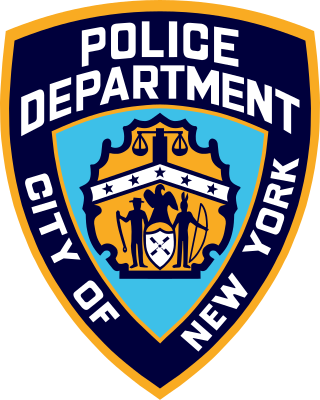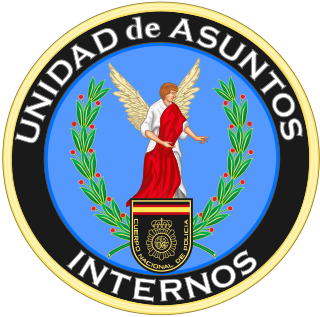Related Research Articles

The New York City Police Department (NYPD), officially the City of New York Police Department, is the primary law enforcement agency within New York City. Established on May 23, 1845, the NYPD is the largest, and one of the oldest, municipal police departments in the United States.

The Police Service of Northern Ireland (PSNI; Irish: Seirbhís Póilíneachta Thuaisceart Éireann; Ulster-Scots: Polis Service o Norlin Airlan), officially the Police Service of Northern Ireland (incorporating the Royal Ulster Constabulary), is the police service responsible for law enforcement and the prevention of crime within Northern Ireland.

Internal affairs is a division of a law enforcement agency that investigates incidents and possible suspicions of criminal and professional misconduct attributed to members of the parent force. It is thus a mechanism of limited self-governance, "a police force policing itself". The names used by internal affairs divisions vary between agencies and jurisdictions; for example, they may be known as the internal investigations division, professional standards or responsibility, inspector or inspectorate general, internal review board, or similar.
A police board, police services board, or police commission is an appointed commission of a local government charged with the responsibility of overseeing a local police force. Police boards may be required by government regulation, as they are in most of Canada, or they may be voluntarily formed by individual municipalities.
Police misconduct is inappropriate conduct and illegal actions taken by police officers in connection with their official duties. Types of misconduct include among others: sexual offences, coerced false confession, intimidation, false arrest, false imprisonment, falsification of evidence, spoliation of evidence, police perjury, witness tampering, police brutality, police corruption, racial profiling, unwarranted surveillance, unwarranted searches, and unwarranted seizure of property.

The NYC Civilian Complaint Review Board (CCRB) is a civilian oversight agency with jurisdiction over the New York City Police Department (NYPD), the largest police force in the United States. A board of the Government of New York City, the CCRB is tasked with investigating, mediating and prosecuting complaints of misconduct on the part of the NYPD. Its regulations are compiled in Title 38-A of the New York City Rules.
The Office of Police Integrity (OPI) was the Australian state of Victoria independent police oversight and anti-corruption agency established by the Victorian Government in November 2004. OPI ceased operation on 9 February 2013 and was replaced by the Independent Broad-based Anti-corruption Commission (IBAC). OPI's official role was to detect, investigate and prevent police corruption and serious misconduct and to ensure that police members had regard to the human rights set out in the Victorian Charter of Human Rights and Responsibilities.

The government of Portland, Oregon is based on a city commission government system. Elected officials include the mayor, commissioners, and a city auditor. The mayor and commissioners are responsible for legislative policy and oversee the various bureaus that oversee the day-to-day operation of the city. Portland began using a commission form of government in 1913 following a public vote on May 3 of that year. Each elected official serves a four-year term, without term limits. Each city council member is elected at-large.
Police accountability involves holding both individual police officers, as well as law enforcement agencies responsible for effectively delivering basic services of crime control and maintaining order, while treating individuals fairly and within the bounds of law. Police are expected to uphold laws, regarding due process, search and seizure, arrests, discrimination, as well as other laws relating to equal employment, sexual harassment, etc. Holding police accountable is important for maintaining the public's "faith in the system". Research has shown that the public prefers independent review of complaints against law enforcement, rather than relying on police departments to conduct internal investigations. There is a suggestion that such oversight would improve the public's view on the way in which police officers are held accountable.

The Cleveland Division of Police (CDP) is the governmental agency responsible for law enforcement in the city of Cleveland, Ohio.
Civilian oversight, sometimes referred to as civilian review or citizen oversight, is a form of civilian participation in reviewing government activities, most commonly accusations of police misconduct. Members of civilian oversight boards are generally not employed by the government entity which they are reviewing. These groups are tasked with direct involvement in the citizen complaints process and develop solutions to improve government accountability. Responsibilities of civilian oversight groups can vary significantly depending on the jurisdiction and their ability to become influential. Oversight should not simply criticize but should improve government through citizen support for government responsiveness, accountability, transparency, and overall efficiency.

Police reform in the United States is an ongoing political movement that seeks to reform systems of law enforcement throughout the United States. Many goals of the police reform movement center on police accountability. Specific goals may include: lowering the criminal intent standard, limiting or abolishing qualified immunity for law enforcement officers, sensitivity training, conflict prevention and mediation training, updating legal frameworks, and granting administrative subpoena power to the U.S. Department of Justice for "pattern or practice" investigations into police misconduct and police brutality.

The Office of the Independent Police Review Director is an independent civilian oversight agency that handles public complaints regarding police conduct in the Canadian province of Ontario. The agency oversees municipal police services and the Ontario Provincial Police.
The Detroit Board of Police Commissioners is the civilian oversight organization of the Detroit Police Department. The current 11-member board has broad supervisory authority over the department.
The Law Enforcement Conduct Commission oversights, monitors and investigates allegations of serious misconduct by the NSW Police Force (NSWPF) and NSW Crime Commission (NSWCC). It was set up on 1 July 2017 to replace the Police Integrity Commission and the Police and Compliance Branch of the Office of the Ombudsman

Justin Morris Bibb is an American politician and former non-profit leader serving as the 58th mayor of Cleveland, Ohio since January 2022. Prior to serving as mayor, Bibb worked with public officials, business leaders and community organizations across the country as the Chief Strategy Officer of Urbanova, a business that leads new initiatives to make cities safer, healthier and more resilient. Bibb was the Co-Chair of Teach for America – Ohio, and a board member for the Greater Cleveland Regional Transit Authority, Destination Cleveland, and LAND Studio.
The Patrolmen's Benevolent Association Riot, also known as the City Hall Riot, was a rally organized and sponsored by the Patrolmen's Benevolent Association of the City of New York (PBA) held on September 16, 1992, to protest mayor David Dinkins' proposal to create a civilian agency to investigate police misconduct. Approximately 4,000 NYPD officers took part in a protest that included blocking traffic on the Brooklyn Bridge and jumping over police barricades in an attempt to rush City Hall. Rioters were observed to be openly drinking, damaging cars, and physically attacking journalists from the New York Times on the scene. Rioters also chanted racial epithets towards the African-American Mayor Dinkins. The nearly 300 uniformed on-duty officers did little to control the riot.

Police brutality in Ethiopia falls under the aegis of the Ethiopian Federal Police (EFP), which has responsibility for safeguarding civil law and abiding the country's constitution under Proclamation 2000, 2003 or 2011. Under Federal Police Officer Administration Regulation of 2012, dual obligation is promulgated to reinforce the law that every police officers should respect international human rights instructions and legal liability.
Five government agencies in the city of Chicago are charged with oversight of the Chicago Police Department. These agencies have overlapping authority and their membership is determined through a mix of appointments by the Mayor of Chicago, confirmations by the Chicago City Council, and elections. The agencies were created and reformed over several years as a result of ongoing efforts for civilian oversight of law enforcement and in response to numerous controversies in the police department.
References
- 1 2 Walker, Larry J.; Brooks, F. Erik; Goings, Ramon B. (22 June 2017). How the Obama Presidency Changed the Political Landscape. Bloomsbury Publishing USA. ISBN 979-8-216-09929-1.
- ↑ Vogelsang-Coombs, Vera (5 May 2016). The Political Ethics of Public Service. Springer. ISBN 978-1-137-49400-9.
- ↑ Walker, Samuel (2024-07-16). The Future of Police Reform: The U.S. Justice Department and the Promise of Lawful Policing. NYU Press. ISBN 978-1-4798-2604-9.
- ↑ Tighe, J. Rosie; Ryberg-Webster, Stephanie (2019-06-04). Legacy Cities: Continuity and Change amid Decline and Revival. University of Pittsburgh Press. ISBN 978-0-8229-8688-1.
- ↑ "Cleveland police oversight amendment Issue 24 passes by a wide margin". Ideastream Public Media. 2021-11-03. Retrieved 2024-03-18.
- ↑ Vanisko, Anastazia (2024-02-06). "Cleveland Community Police Commission has final discipline say". Signal Cleveland. Retrieved 2024-03-18.
- ↑ Tarlow, Peter E. (2023-04-21). Challenges to US and Mexican Police and Tourism Stability. Emerald Group Publishing. ISBN 978-1-80382-405-5.
- ↑ Casanova, Stephanie (2023-09-06). "Community Police Commission asks for resident input". Signal Cleveland. Retrieved 2024-03-18.
- ↑ Documenters, Cleveland (2023-08-23). "Police commission to examine CPD technology, youth policies". Signal Cleveland. Retrieved 2024-03-18.
- ↑ Documenters, Anastazia Vanisko, Cleveland (2023-09-02). "Cleveland police accountability agency heads explain their roles". Signal Cleveland. Retrieved 2024-03-18.
{{cite web}}: CS1 maint: multiple names: authors list (link) - ↑ "Cleveland's Community Police Commission takes steps to assert its authority". Ideastream Public Media. 2023-12-20. Retrieved 2024-03-18.
- ↑ Courtney Astolfi, cleveland com (2023-12-13). "Community police commissioner demands more oversight of Cleveland police policy. Mayor calls plan 'dangerous'". cleveland. Retrieved 2024-03-18.